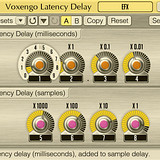Voxengo has updated a number of its freeware effect plug-ins.
While Voxengo Overtone GEQ and Voxengo Sound Delay plug-ins received several minor fixes, other plug-ins in this set were upgraded to their next major version, with a lot of additions over the previous version: multi-platform support, undo/redo function, preset manager, user interface coloration, user interface re-scaling, plug-in instance naming, bypass switch.
Updated free plug-ins
- Beeper, an auxiliary audio processing plug-in which you can use to insert short beep, noise burst or silence signals to any sound material. This may help you protect your work from stealing. It is safe to apply this plug-in to any mission-critical material because plug-in does not perform any processing on the audio between signals. You may specify signal’s duration, beep frequency, signal’s loudness, period between signals and random variation of all parameters.
- Latency Delay, an auxiliary plug-in which allows you to compensate latency produced by any audio plug-ins, instruments and processes which produce latency but do not try to report it to the host. Latency Delay introduces 10000 samples latency itself and delays the audio signal by 10000 minus the specified amount of samples or milliseconds. Please note that host audio application should support the latency compensation itself for this plug-in to function properly.
- MSED, a professional audio encoder/decoder plug-in for mid/side processing which is able to encode (split) the incoming stereo signal into two components: mid/side pair, and vice versa: decode mid/side signal pair into stereo signal. MSED is also able to work in the “inline” mode with the ability to adjust mid and side channels’ gain without the need of using two plug-in instances in sequence.
- Overtone GEQ, a 7-band harmonic (overtone) graphic equalizer with multi-channel operation support (supporting up to 8 input/output channels, host setup-dependent). Overtone GEQ offers extensive internal channel routing capabilities, and supports mid/side channel processing. Beside equalizing, Overtone GEQ applies harmonic enhancement processing: it uses 7 harmonic enhancement modules, one for each EQ band. This generates a complex harmonic coloration you will probably like a lot. Overtone GEQ was designed to allow audio engineers to apply quick EQ shape adjustments together with adding a bit of harmonic richness to the audio material (mainly mixes and sub-mixes due to a comparably high processing load this EQ puts on a CPU).
- Sound Delay, an auxiliary multi-channel signal delaying plug-in for professional audio applications. You may specify delay time in both milliseconds and samples, with a high level of precision. This plug-in – being technical in its purpose – provides a basic signal delaying function only, without signal feedback or modulation capabilities. Sound Delay also features internal mid/side encoding and decoding, and allows you to delay mid and side channels independently.
- Stereo Touch, this professional audio plug-in implements a classic technique of transforming a monophonic track into spacious stereophonic track by means of mid/side coding technique. This plug-in is most effective on monophonic sounds without overly sharp transients: it works great for both acoustic and electric/overdriven guitars, synthetic pad sounds and even vocals.
These plug-ins are available as freeware for Windows and Mac (VST/AU).
More information: Voxengo



